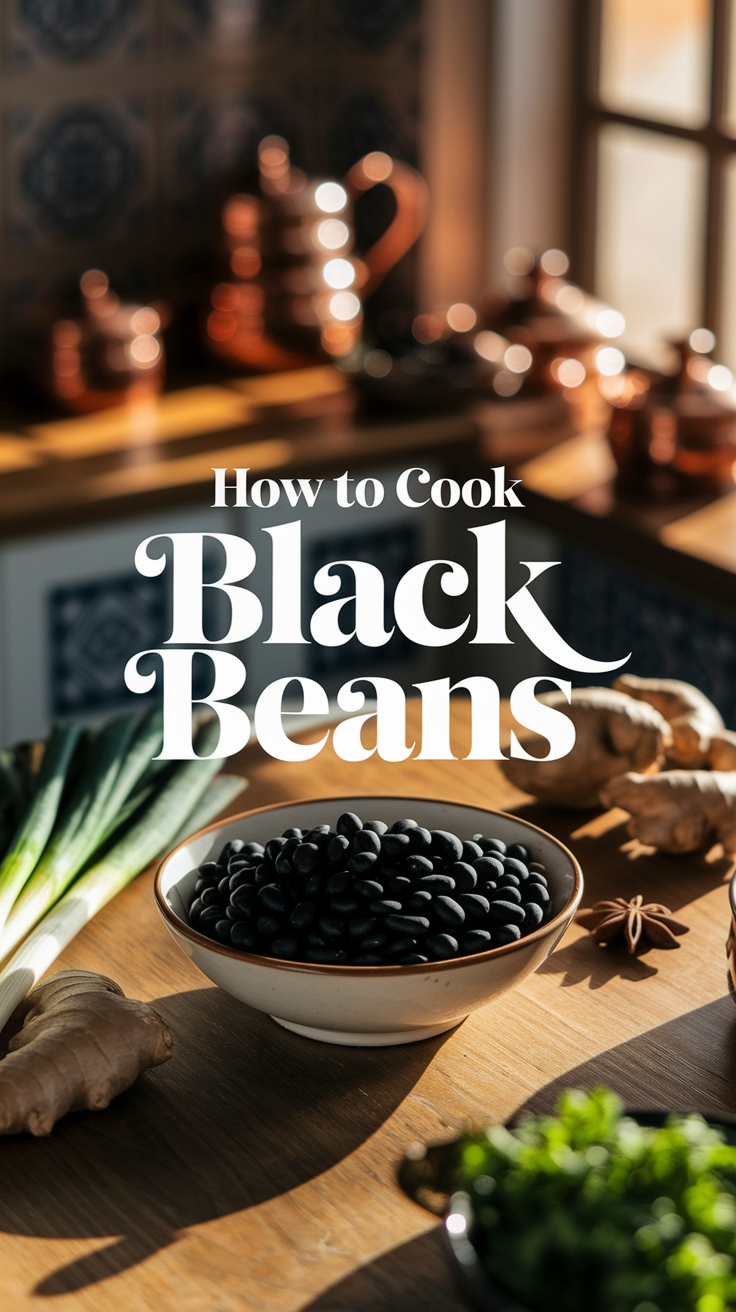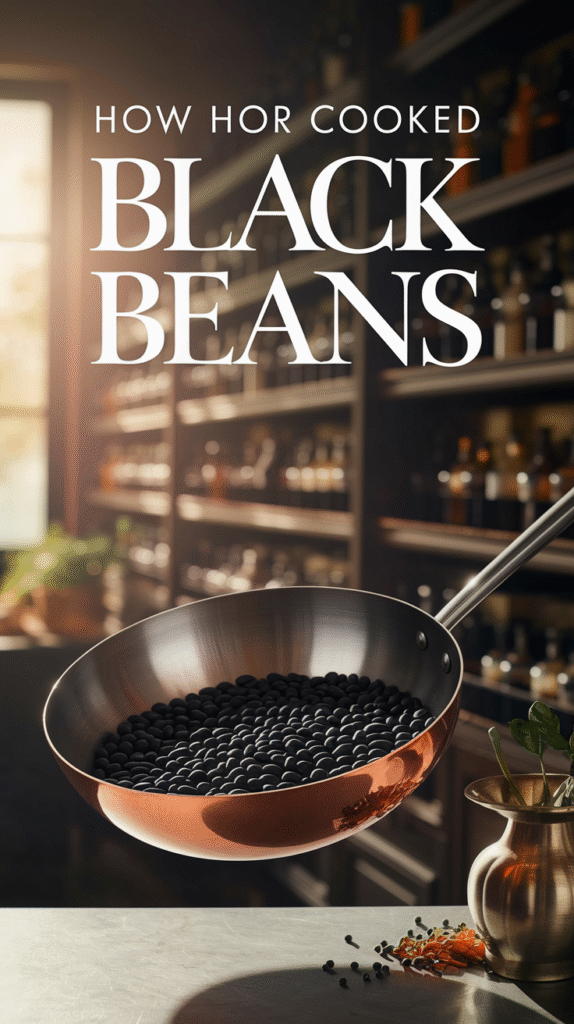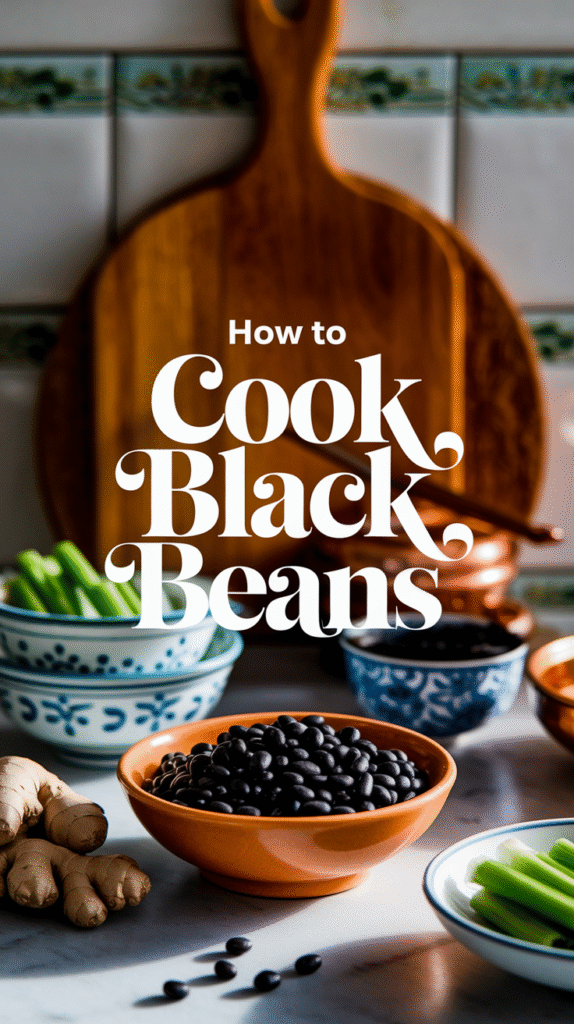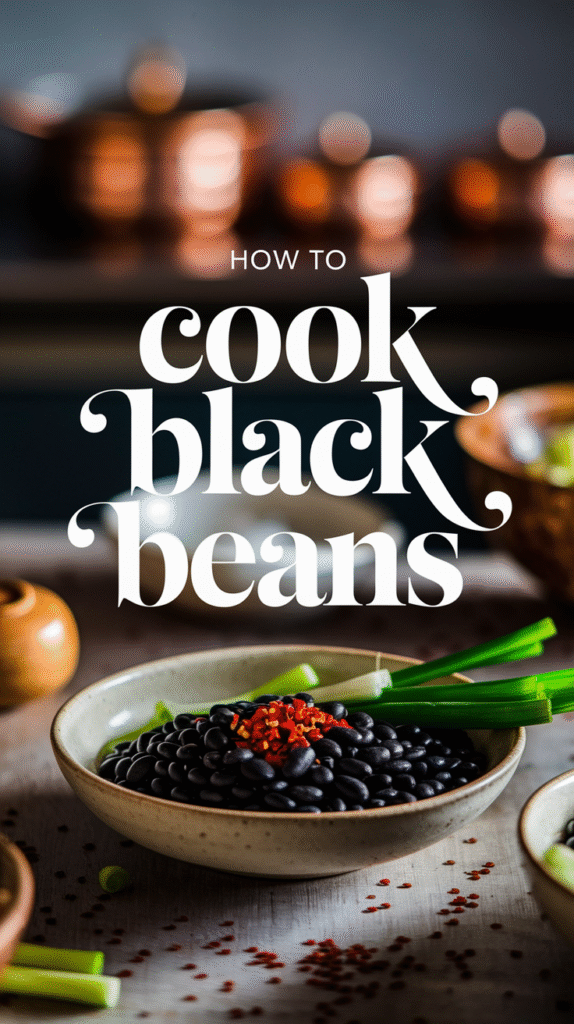Black beans are a versatile, nutritious, and delicious ingredient that can be used in a variety of dishes. Cooking black beans at home is satisfying and allows you to control flavors and textures. Whether you’re preparing them for a delightful bean salad, a hearty chili, or a savory bean dip, knowing how to cook black beans properly will enhance your meals. Here are essential tips and techniques to achieve perfectly cooked black beans.
Choosing the Right Beans
Start by selecting high-quality dry black beans. Look for beans that are shiny and firm, avoiding any that appear cracked or shriveled. It’s best to purchase from a reputable source to ensure freshness.
Soaking Black Beans
Soaking your beans can significantly reduce cooking time and help achieve a better texture. You can choose between two soaking methods:
- Overnight soak: Place the beans in a large bowl, cover with water, and let them soak for 8-12 hours. This method is great for even, consistent cooking.
- Quick soak: Add the beans to a pot, cover with water, and bring to a boil. Boil for about 2 minutes, remove from heat, cover, and let them sit for 1 hour. This method is faster but may yield slightly less tender beans.
Cooking Black Beans
Once soaked, it’s time to cook your black beans. Follow these steps for the best results:
- Rinse: Drain the soaked beans and rinse them under cold water. This helps remove any impurities and excess sodium if you’ve added salt during soaking.
- Add to a Pot: Place the rinsed beans in a large pot and cover with fresh water. Use a ratio of about 3 cups of water for every cup of soaked beans.
- Add Flavor: You can enhance the flavor by adding aromatics such as onion, garlic, bay leaves, or spices. Feel free to customize it according to your taste.
- Cook: Bring the pot to a boil then reduce to a gentle simmer. Cover and cook for about 1 to 1.5 hours, or until the beans are tender. Check occasionally and add more water if necessary to keep the beans submerged.
- Season: Once cooked, season the beans with salt towards the end of cooking. Adding salt too early can toughen the beans.
Canned Black Beans Alternative
If you don’t have the time for soaking or cooking dry beans, canned black beans can be a convenient option. When using canned beans:
- Rinse them under cold water to remove excess sodium.
- Heat them in a saucepan with some spices, aromatics or broth, simmering for about 10-15 minutes to enhance their flavor.
Storing Cooked Black Beans
Proper storage of cooked black beans ensures you can enjoy them later. After cooking, let the beans cool completely. Then, transfer them to an airtight container. Cooked black beans can be stored in the refrigerator for up to 5 days or frozen for up to 3 months.
Creative Ways to Use Black Beans
Now that you know how to cook black beans, here are some delicious ideas to incorporate them into your meals:
- Black bean tacos topped with fresh avocado and salsa.
- Hearty black bean chili with bell peppers and spices.
- Black bean salad with corn, tomatoes, and cilantro.
- Black bean dip served with tortilla chips.
For more recipes and inspiration on cooking black beans, you might find these websites helpful: Love and Lemons and Cookie and Kate.
With these tips and techniques, you’ll be well on your way to mastering the art of cooking black beans. Enjoy the process of making flavorful and healthful dishes that your family and friends will love!
The Nutritional Benefits of Black Beans in Your Diet
Black beans are a staple ingredient in many diets around the world, known not only for their unique flavor but also for their abundant nutritional benefits. These legumes are packed with essential nutrients, making them an excellent addition to your meals. Let’s explore the various health benefits and nutritional values of black beans and how they can elevate your diet.
Nutritional Profile of Black Beans
| Nutrient | Amount per 1 cup (cooked) |
|---|---|
| Calories | 227 |
| Protein | 15.24 grams |
| Carbohydrates | 40.36 grams |
| Fiber | 13.56 grams |
| Fat | 0.9 grams |
| Iron | 3.61 mg |
| Folate | 256 mcg |
When you incorporate black beans into your diet, you gain access to a powerhouse of nutrients. They are rich in protein, making them an excellent alternative to meat, especially for vegetarians and vegans. The significant fiber content aids in digestion and can help maintain a healthy weight, as it keeps you feeling full longer.
Health Benefits
Black beans offer numerous health benefits that can enhance your overall well-being. Here are some key advantages:
- Heart Health: Black beans are low in saturated fat and high in fiber, which can lower cholesterol levels. Their high potassium content helps regulate blood pressure.
- Weight Management: The fiber and protein in black beans keep you satiated, reducing the likelihood of overeating. these beans can support weight loss strategies.
- Blood Sugar Control: Black beans have a low glycemic index, meaning they can help maintain stable blood sugar levels, making them a smart choice for those with diabetes.
- Digestive Health: With almost 14 grams of fiber per cup, black beans promote a healthy digestive system by helping maintain regular bowel movements and preventing constipation.
- Bone Health: They are a good source of minerals such as calcium, magnesium, and phosphorus which are essential for strong bones.
How to Incorporate Black Beans into Your Diet
Including black beans in your meals is easy and versatile. Here are a few delicious ideas:
- Salads: Toss black beans into your salad for added protein and texture. They pair well with corn, avocado, and a zesty lime dressing.
- Tacos: Use black beans as a filling for tacos along with fresh vegetables and salsa for a healthy twist.
- Soups: Add black beans to soups or stews to enhance flavor and nutrition. They can make a hearty base for vegetarian chili.
- Rice Dishes: Combine black beans with brown rice or quinoa for a complete protein source, perfect for a hearty meal.
- Spreads: Blend cooked black beans with spices to make a nutritious dip or spread for crackers and bread.
When choosing black beans, you can opt for canned varieties for convenience or dried beans to soak and cook fresh. If you go for dried beans, remember to soak them beforehand to reduce cooking time and enhance digestibility.
For more information on the health benefits of black beans and delicious recipes, check out Healthline or Eat Right.
Black beans into your diet is a simple step towards improving your nutrition and health. With their rich flavor, versatility, and numerous health benefits, black beans can easily become a staple in your kitchen. Enjoy experimenting with them in different recipes while reaping the extensive health rewards!
Exploring Different Cuisines that Feature Black Beans
Black beans are a staple in many cuisines around the world. They not only add a rich flavor and creamy texture to dishes but also pack a punch with their nutritional benefits. Let’s explore some of the most popular cuisines that feature black beans and how they incorporate this versatile legume.
Latin American Cuisine
Perhaps the most well-known use of black beans comes from Latin American cuisine. Countries such as Mexico, Brazil, and Cuba proudly highlight black beans in many traditional dishes. Here are a few key dishes:
- Frijoles Negros: In Mexico, black beans are often simmered with garlic, onions, and spices, served as a side dish or as a filling for tacos and burritos.
- Feijoada: This Brazilian stew blends black beans with various cuts of meat. Traditionally served with rice and orange slices, it’s a hearty meal beloved across the country.
- Moros y Cristianos: A famous Cuban dish, it consists of black beans cooked with white rice. The name means “Moors and Christians,” referencing the historical coexistence of different cultures.
Caribbean Cuisine
In the Caribbean, black beans are frequently used in savory stews and rice dishes. A popular dish in Jamaica is:
- Rice and Peas: Despite the name, this dish often employs black beans, simmered with coconut milk, thyme, and spices, creating a fragrant and filling meal.
Black beans are also common in Puerto Rican cuisine, where they are featured in dishes such as bean soup and rice sides.
Southern United States Cuisine
The Southern United States has its unique take on black beans. While kidney beans might get more attention, black beans still play a role in regional favorites:
- Black Bean Chili: A healthy twist on traditional chili, it combines ground meat with black beans, tomatoes, and a variety of spices.
Another dish often found in Southern homes is black bean cornbread, which blends the two nutritious ingredients into a satisfying side dish.
Asian Cuisine
In Asian cuisine, specifically in regions like China, black beans take on a different form. Fermented black beans (Douchi) are used in various stir-fries, providing a distinctive umami flavor. Dishes include:
- Black Bean Chicken: This dish features tender chicken stir-fried with fermented black beans and vegetables.
- Fish with Black Bean Sauce: Steamed or fried fish is often topped with a savory black bean sauce, bringing a rich depth of flavor to the dish.
Middle Eastern Cuisine
Black beans are also found in Middle Eastern cuisine, often incorporated into salads and spreads. Dishes such as:
- Fattoush Salad: This popular salad sometimes includes black beans as an ingredient to add protein and texture.
- Bean Dip: A simple appetizer made with mashed black beans mixed with spices, often served with pita bread.
Nutritional Benefits
Aside from their varied culinary applications, black beans are nutritionally rich. Just a small serving can provide:
- Protein
- Fiber
- Iron
- Folic Acid
- A variety of antioxidants
Including black beans in your diet can support digestion, heart health, and overall wellness. By exploring different cuisines, you can enjoy the diversity of flavors and health benefits that this legume offers.
References for More Information
If you would like to delve deeper into the worlds of black beans and their culinary uses, consider checking out:
- Love and Lemons Black Bean Recipes
- AllRecipes Black Bean Guides
- Healthline on the Benefits of Black Beans
Black beans into your meals can satisfy your taste buds while nourishing your body, showcasing the versatility of this underappreciated ingredient.
Common Mistakes When Cooking Black Beans and How to Avoid Them
Cooking black beans can be a delightful experience, adding a nutritious and flavorful element to your meals. However, many people encounter common pitfalls that prevent them from achieving the perfect dish. Here are the top mistakes to avoid when cooking black beans and tips to ensure you enjoy their rich flavor and texture fully.
Skipping the Soaking Process
One of the most common blunders is ignoring the soaking step. Soaking black beans helps reduce cooking time and ensures a more even texture. If you skip this step, especially when using dried beans, you might end up with tough or unevenly cooked beans.
To soak your beans, simply:
- Place the beans in a large bowl and cover them with three times their volume in water.
- Let them soak for at least 6 hours or overnight for best results.
- Drain and rinse before cooking.
Not Using Enough Water
Another common mistake is not using enough water during the cooking process. Beans absorb a lot of liquid, so if you don’t add sufficient water, they may dry out and scorch.
A good rule of thumb is to use about 3 cups of water for every cup of dry black beans. Add more water during cooking if you notice it evaporating too quickly.
Cooking at Too High a Temperature
Cooking black beans at high heat can lead to uneven cooking and mushiness. It’s important to start the cooking process on medium heat after bringing the beans to a simmer.
Lower the heat and let the beans cook gently. This helps them retain their shape while becoming tender. Aim for a simmer rather than a rolling boil, which can damage the beans.
Add Salt Too Early
Many people mistakenly add salt at the beginning of cooking. Salt can toughen the skin of the beans if added too soon, resulting in a chewy texture.
To avoid this issue, add salt towards the end of the cooking process. Taste the beans when they are nearly done and then season according to your preference.
Neglecting Flavor Enhancements
Black beans can be incredibly bland without the right seasonings. Don’t shy away from enhancing their flavor! You could add:
- Onions and garlic for a savory base.
- Bay leaves or cumin for aromatic depth.
- Fresh herbs like cilantro for a burst of freshness.
Consider preparing a sofrito or sautéed vegetable mix to enhance the overall taste of your beans.
Using Old Beans
Old beans often take longer to cook and may not soften properly. Always check the expiration date on the package. When beans are old, they may remain tough no matter how long you cook them.
For the best results, purchase high-quality beans from reputable sources. If you have old beans lying around, consider testing one before cooking a larger batch.
Overcooking or Undercooking
Finding the perfect cooking time can be tricky. Undercooking leads to beans that are hard, while overcooking can result in a mushy mass. To achieve the right texture:
- Check the beans for doneness by tasting them periodically.
- Set a timer, but adjust based on your cooking method and the age of the beans.
Not Storing Beans Properly
If you’re cooking a large batch of black beans, storing leftovers correctly is crucial. Improper storage can lead to spoilage. Here’s how you should store them:
- Allow the beans to cool completely before refrigerating.
- Store them in an airtight container in the fridge for up to 5 days.
- For longer storage, freeze them in portions. They can last for up to 6 months in the freezer.
By avoiding these common mistakes, you can elevate your cooking game and serve delicious black beans every time. For more detailed tips and recipes, check out Food Network and Love and Lemons to explore a world of culinary creativity.
Creative Recipe Ideas Using Black Beans as the Star Ingredient
Black beans are not only a nutritious addition to your diet but also incredibly versatile in the kitchen. Whether you’re looking to add protein to your meals, explore vegetarian options, or simply enjoy the rich flavor, black beans can shine in a variety of dishes. Here are some creative recipe ideas that showcase black beans as the star ingredient.
Black Bean Tacos
Tacos are a fantastic way to use black beans. They are easy to prepare and packed with flavor. For a delightful black bean taco, you will need:
- 1 can of black beans, rinsed and drained
- 1 teaspoon cumin
- 1 tablespoon olive oil
- Soft or hard taco shells
- Toppings like avocado, salsa, cheese, and lettuce
To make, heat the olive oil in a pan, add the beans and cumin, and stir until warmed. Fill your taco shells with the seasoned beans and add your favorite toppings. This dish is quick, satisfying, and perfect for weeknight dinners!
Black Bean Soup
For a hearty meal, black bean soup is a comforting choice. Here’s a simple recipe:
- 2 cans of black beans
- 4 cups vegetable broth
- 1 onion, diced
- 2 cloves garlic, minced
- 1 teaspoon chili powder
- 1 bell pepper, diced
In a large pot, sauté the onion and garlic until fragrant. Add the bell pepper and cook for another few minutes. Stir in the black beans, broth, and chili powder. Bring to a boil, then reduce heat and simmer for 20 minutes. Blend for a creamy texture or leave it chunky for a rustic feel.
Black Bean Burgers
Make your own black bean burgers for a delicious vegetarian meal. Here’s how:
- 1 can black beans, drained and mashed
- 1/2 cup breadcrumbs
- 1 egg
- 1/2 onion, diced
- 1 teaspoon cumin
Mix all ingredients in a bowl. Form into patties and grill or fry until golden. Serve with lettuce, tomato, and your favorite burger toppings. These black bean burgers are not only tasty but also a great protein-packed option.
Black Bean Salad
A refreshing black bean salad can double as a side dish or a light meal. For this salad, gather:
- 1 can black beans, rinsed
- 1 cup corn
- 1 bell pepper, diced
- 1/4 cup red onion, chopped
- 1/4 cup cilantro, chopped
- 1 lime, juiced
Combine all ingredients in a bowl and toss well. The zesty lime dressing complements the beans and vegetables perfectly. This salad is colorful, nutritious, and can be made a day ahead!
Black Bean Quesadillas
Quesadillas are another great way to bring black beans into your meals. Here’s a simple version:
- 1 can black beans, drained
- 1 cup shredded cheese
- Flour tortillas
- Salsa for dipping
Spread the black beans and cheese onto a tortilla, top with another tortilla, and grill on both sides until golden. Cut into wedges and serve with salsa for dipping. This makes a fantastic snack or appetizer!
Black Bean Brownies
Surprisingly, you can even use black beans in desserts. Black bean brownies are a deliciously healthy option. For these brownies, you will need:
- 1 can black beans, rinsed and drained
- 1/2 cup cocoa powder
- 1/2 cup honey or maple syrup
- 1 teaspoon vanilla extract
- 2 eggs
Preheat your oven to 350°F (175°C). Blend all ingredients until smooth, then pour into a pan and bake for about 25 minutes. Your guests will be amazed at how delicious and fudgy these brownies are!
For more ideas and inspiration on cooking with black beans, visit AllRecipes or Food Network. Black beans are a wonderful ingredient that can diversify your meals profusely. So, give them a try! You will not only enjoy the taste but also provide your body with essential nutrients.
Conclusion
Cooking black beans can be a rewarding experience that not only enhances your culinary skills but also boosts your health with their nutritional benefits. By mastering essential tips and techniques, you can elevate this versatile ingredient to new heights in your kitchen. With their rich flavor and hearty texture, black beans serve as a foundation for various cuisines, from classic Latin dishes to innovative fusion recipes.
Avoiding common mistakes, such as under-soaking or overcooking, ensures that your beans turn out perfectly each time. You’ll be able to create delicious meals that showcase black beans as the star ingredient, whether you’re whipping up a zesty black bean salsa, a comforting soup, or a savory veggie burger. The versatility of black beans opens doors to endless creative possibilities, allowing you to explore different flavors and cuisines.
Black beans into your diet not only diversifies your meals but also contributes to better health. Their high fiber content and rich protein source keep you feeling full and satisfied. So, take some time to experiment with black beans in your next culinary adventure. With all the tips and recipe ideas at your disposal, you’ll find that these humble legumes can truly transform your dishes and tantalize your taste buds. Happy cooking!







